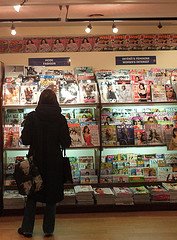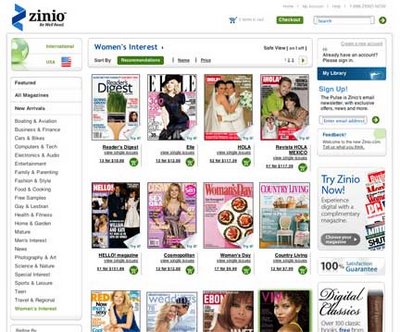MAGAZINE WRITING SUCCESS e-course Starts Wednesday May 20
Have you checked out WOW !'s brand new Workshops & Classes page? If you subscribe to our newsletter, you probably saw all the great new e-courses we're offering. The first class to kick off our summer season is Wendy Meyeroff's Magazine Writing Success Course! Wendy is still accepting students, so if you're interested in learning the craft of magazine writing and marketing your work to this lucrative market, be sure to take advantage of this opportunity!  MAGAZINE WRITING SUCCESS: THERE IS STILL WORK IN MAGAZINE WRITING. HOW TO GET IT—AND KEEP BUILDING ON IT, by Wendy Meyeroff MAGAZINE WRITING SUCCESS: THERE IS STILL WORK IN MAGAZINE WRITING. HOW TO GET IT—AND KEEP BUILDING ON IT, by Wendy Meyeroff
START DATE: Wednesday, May 20, 2009 DURATION: 6 weeks COURSE DESCRIPTION: This is a class for writers who’d like to build a portfolio (and make money). Magazine articles are a great place to start. The class not only discusses writing non-fiction articles for well-known publications (e.g., Cosmo, Good Housekeeping, Wired), it teaches students to look beyond them and points out other avenues for both income and recognition. This is NOT a how-to-write class; it’s about finding saleable story ideas, marketing yourself and your work, and getting the best price for it. At the end of class, students receive a free e-zine summarizing top 10 class highlights, for easy review. WEEKS AT A GLANCE: Week 1: Broadening Your Horizons. Includes introducing students to outlets beyond well-known publications Week 2: Tricks of the Trade to Help You Get In (Includes a Checklist for Magazine Analysis) Week 3: Creating More Effective Query Letters Week 4: Setting Your “Hourly Rate” Week 5: The Art of Negotiating Week 6: Going Green: Extra Income Through Recycling Your Articles
ABOUT THE INSTRUCTOR: I started as a reporter and then also an editor at a variety of trade magazines (pharmacy, optical and telecommunications). My work on the pharmacy magazine eventually got me a freelance assignment: a newspaper column, “Health & Beauty Hotline,” which was distributed to over 250,000 readers weekly for three years. These clips got me into Family Circle magazine and then to Woman’s Day, Working Mother, and Weight Watchers (plus many other publications). That led me to become one of the first writers for webzines, like CBSHealthwatch.com. And all of this helped me get commercial contracts for much more money down the line. Visit our Workshops & Classes Page for full details! https://www.wow-womenonwriting.com/WOWclasses.htmlLabels: freelance writing for magazines, magazine writing online course, Wendy Meyeroff, WOW Women On Writing Workshops and Classes
When did I become such a mercenary?
I'm a writer. I'm a blogger. Yep. We established that a few posts back. But here's my dilemma.... Am I a writer because I get paid to write? Or because writing is my creative outlet? Or both? Or neither? If I write an article for a magazine or newspaper and I am paid that feeds the belief that I am a writer. If I blog and I'm not paid--in the same manner as a print article--does that feed the same belief that I'm a writer/blogger? The reason I ask is that frequently, as a writer, I've been asked by friends about their becoming a writer. I recommend a few books, wish them luck and, if they find their skin is thick enough, we enjoy future discussions about this editor or that one. It's part of the networking of writers. But go to a writers' conference and, friendly and fun as it may be, we're all in line to pitch the same editor, competing with one another. Just as my mentoring writer friends did with me, when my friends want to understand how the business works and I'm happy to encourage them, suggest some books and then let them go find their way. Blogging seems to work in the reverse. At blogging conferences, it seems, there is a joi d'vivre and everyone is happy to see and meet everyone else. There isn't the same competition. My blog is mine, yours is yours. We reach different audiences and I don't have to convince an editor to buy my ideas or words. More and more I'm being approached to talk to friends and acquaintances who want to start their own blog. But blogging has a technical and business element that is missing from writing for magazines. The talks are more in depth, balancing technology, terminology and the business of writing. Is it wrong to want to monetize these talks? Do you have this dilemma? I hope this analogy works, but could it be the difference between the casual cocktail party conversation talking about your health with a doctor and making an appointment to actually talk to a doctor? Elizabeth King Humphrey is a creativity coach and the moderator/main blogger for CoastalCarolinaMoms. She is also a freelance writer and can hardly wait to stop thinking money and starting thinking creativity...or at least gardening. Check it out at TheWriteElizabeth. In between answering comments, she'll be playing in the dirt...flower and vegetable seeds at the ready.Labels: blog monetization, blogging for bucks, business writing, freelance writing, freelance writing for magazines
Ten Ways To Get Cheap (Or Free) Magazine Samples
 Aside from being fun to read, we as writers need to study the publications we're trying to break into. I've gotten loads of cheap magazine subscriptions through various online discount sites, and even ebay. Here are some additional ways to obtain the magazines you're interested in, from freelancer Pam White. Aside from being fun to read, we as writers need to study the publications we're trying to break into. I've gotten loads of cheap magazine subscriptions through various online discount sites, and even ebay. Here are some additional ways to obtain the magazines you're interested in, from freelancer Pam White.
--MP1 - Join a reading or writing group. Ask members to bring in their already-read magazines and have an exchange. Do the same with interest groups you belong to or know about - playgroups (parenting, home, cooking, family mags), business networking groups (entrepreneurs, home business, finances magazines), church (religious, devotional periodicals). 2 - Offer to take a friend to the doctor’s office. Okay, that sounds goofy but I love taking my children to the orthodontist, pediatrician, and dentist offices so I can scan the table of contents and skim the articles in the parenting, children’s, family, travel and money magazines. I bring a notepad and take plenty of notes. Find an article in an old magazine that would help your research? Ask the office to make a copy of it; offer to pay. 3 - Subscribe. Remember if you subscribe to a magazine that is for business purposes, you can deduct the cost of the subscriptions if you itemize your taxes. I am a food writer so I keep all receipts for food and writing magazines, and food and writing books to deduct as business expenses. 4 - Take up publishers on their free copy offers. It used to be that all magazines would let your send in a postcard and check the "bill me" square and you’d end up with two or three issues before they cut you off for not paying. These days, we cannot even be inadvertently dishonest. I get mailings from magazines offering me one free issue. I will send in the postcard and usually have a bill to pay before I’ve read the free issue. I then can decide to subscribe or put the bill in the postage paid envelope and decline to pay. 5 - Look for the online issues of particular magazines. It’s true that many use original content online (another good market to explore) but even the different content will show you what type of material the magazine is looking for. 6 - Read newspapers online. Do you want to write travel articles? Visit the major newspapers online. Most hire freelancers to cover a great deal of their special interest articles. Contact information for, in this example, the travel section editor will likely be available on the website. 7 - Write for guidelines. Look in The Writer’s Market. If you are looking for parenting magazines and find one that sounds about right to you but you’ve never seen, write for the writer’s guidelines and request a sample issue. Double check the listing of the magazine to see if there is a reduced price or you have to send a stamped envelope to receive a free copy. 8 - Go to the library. This is so obvious! Make a bi-weekly appointment to go to the library and review the magazines you want to write for. Make notes. Use the library’s copier to photocopy the table of contents, or an article or two to review at home. 9 - If your public library doesn’t carry the magazines you want to know about, travel to a college library. They are set up for your kind of research. While most require student identification to use the reference materials, you can read the periodicals unimpeded. 10 - Bookstores! Grab a pile of magazines, buy that over-priced latte and carefully review the magazines you’ve found to study (remember, if you spill on it, you buy it!) (c) Pamela White, 2006 About the author: Pamela White published Food Writing, the free ezine for food writers from her website: www.food-writing.com She teaches food writing classes, and her book, Make Money as a Food Writer in Six Lessons, is available at Amazon.com. Photo courtesy of PinkMoose, flickr.com Labels: freelance writing for magazines, magazines, Marcia Peterson, pam white
Mistake Noted
Not too long ago in my zest and zeal to send out query letters, I began coming up with ideas for queries that related to life as I was living it. And how was I living, you may ask? During this rampant, query-writing fest I had a two-and-a-half year old running around and a two-month old nursing every 3 hours. Life was crazy, and maybe I can blame the query faux pas I committed on sleep deprivation and hormone fluctuations. I came up with what I thought was the greatest idea for a story: how to breastfeed in public. My own mom didn’t give me many tips except “Just put a blanket over your shoulder,” and the lactation nurses weren’t much more helpful (they told me to just wear big shirts). I figured if I was having a hard time other moms were probably having a hard time, too, and would appreciate a how-to article that showed them the ropes. I had my sources lined up, a body of research and I knew which magazine I was going to pitch the story to: American Baby Magazine. I looked through old issues to make sure that they hadn’t covered my exact topic but found that they did lots of articles about feeding new babies. I wrote the query, thinking that I had the golden ticket for making it in the glossies with this pitch. With trepidation, I mailed off my query and began to wait. The odd thing was I didn’t have to wait very long. I received back a letter a week later that said thanks but no thanks. Instead of being devastated, truthfully I was a little relieved. After all of my research on different tips and tricks for breastfeeding in public, I had exhausted my brain on the topic and it was no longer very interesting to me. I was glad was not to be required by an editor to make that story happen. My relief aside, I did want to understand why the story was rejected. I don’t know for sure but some clarity came a few weeks later when I was telling a friend about that particular query. I told her it was about breastfeeding in public and she looked at me almost startled. “Omigosh, Sue,” she said, “that is such a controversial topic. Ask three women about it and you’d get four opinions back. If I was an editor I wouldn’t want to touch that topic with a ten-foot pole.” I sat there a little more than stricken by my friend’s bluntness, but I thought she was right. In all my research, in all my consideration of whether or not women would want to hear about my topic, I had not taken into account that the subject of breastfeeding in public was too taboo for that particular magazine. Now, if I had pitched it to, say an OB nurse quarterly, or a publication of the La Leche League, perhaps I would have gotten a different response. Since I chose to pitch it to a national magazine that needs to carefully take into account the sensibilities and opinions of a wide audience, I’m not surprised that this one was quickly overlooked. Of course, I don’t know for sure why this query was rejected by that magazine; there could have been many other reasons besides the topic being controversial. Through the experience, though, I learned to take into consideration a different aspect of what a publication may look for or avoid in an article. - Susan L. EberlingLabels: articles, freelance writing, freelance writing for magazines, Query Letter, Susan L. Eberling
Are All-Media-Worldwide Rights Becoming the Norm?
 Rosie is concerned! Rosie is concerned!As a publisher, I can understand the benefit of adding the clause of "all-media worldwide rights" to a work-for-hire contract, but as a freelancer myself, and one who supports freelance writers, I just can't agree with it. In a nutshell: let's say you were accepted to write an article for so-and-so's print magazine and signed a work-for-hire contract with the term "all-media worldwide rights" in it. That means the publisher can republish your work in any format they choose--online, video, print, television, radio, etc.--without paying you anything further. How is this possible? It is, and it's becoming standard practice in the U.S., as mentioned in a recent Folio Magazine article. What I don't completely understand is why. Even if the readers are exactly the same--which they couldn't possibly be--there shouldn't be any reason for non-payment. If you think about it, the two avenues should be set up to monetize different income streams. Print has its advertising, and so does web--there should be a budget for both. There's definitely a separation between the two, or there should be. Many have the ability to pay freelancers at least a percentage, or a reprint rate, so why is this practice becoming the norm? My only guess is that the majority of freelancers are rolling over and taking it. And so are editors. At one time, magazine editors were the voice for their writers, but not so anymore as management gets a tighter grasp and a new generation of editors--who don't know any different--step in. But, it's not all doom-and-gloom! There are common-sense solutions you can use to protect yourself. ASJA (American Society of Journalists and Authors) offers this piece of advice: "We have a suggestion. Get the contract before you start working, try negotiating, and if they refuse to offer an alternate document or make reasonable changes, go elsewhere. The market ultimately speaks, and even though publishers and editors like to pretend that writers are a dime a dozen, they know it's not true. It's too hard to find the talent and dedication to get a good story. Try pitching different types of stories to other markets, or take your ideas to their competitors. When the writers they want don't want them, the tune will eventually change. It won't be the first time, and it won't be the last."ASJA is a great organization with sound solutions. Too bad they stopped publishing their "Contracts Watch" newsletter in 2007--it was such a great resource to find out the latest on publisher's contracts, as well as an advocate for writers in the trenches. But you can still view their online archives and read quotes from freelance writers and ASJA's answers here: www.contractswatch.com. So, what do we do about "all-media worldwide rights" becoming the norm? I don't have the solutions, but do recall the recent writer's strike by the Writers Guild of America and their victory, albeit somewhat slim, on being awarded residuals from DVD and "new media" compensation. That aside, one thing you can do is to look out for certain clauses in any contract you sign: (the clauses below were published in the print version of Folio Magazine's article--a sample from CXO Media's freelance contract) - Payment: $______ for all-media world rights in perpetuity upon acceptance of publication.
- CXO will own all-media world rights for the Work including perpetual and irrevocable license to print, reprint and distribute the work in any fashion or medium.
- You specifically waive any and all "artist's rights" you may have pursuant to any state or federal statutes regarding the Work purchased by CXO.
And, if you check out the previously mentioned Folio Magazine article, read the comment submitted by a publisher. Basically, since the publisher purchased all rights for both print and digital, it allowed the publisher to resell the article to a service, who then resold it elsewhere, and gave them a percentage of the profit from the sales... without paying the writer any profit. She admits it wasn't fair to the authors, but only after she realized that the new sellers resold it until the stories were everywhere and it ultimately undermined the value of the stories. I know I'm going to get flack for this post from my peers, but c'est la vie. I simply don't think it's fair to treat freelancers this way. What do you think? And what should freelancers do? ------ Join these discussions and more by subscribing to the Premium-Green Markets: the Women's Guide to Freelance Writing and MarketsLabels: all media world rights, freelance writers, freelance writing for magazines, writer's contracts
The Birth of the Digital Newsstand
Did you know that digital magazines are booming? It’s a market that has been out for less than five years, but it’s just now beginning to take off, and I can understand why. Have you ever wanted to read a magazine right now, at the very moment you think about it, but you can’t get to the bookstore, newsstand, or market? I know I have. Well, now you can go to a virtual newsstand and purchase that publication to view immediately. Not only can you read your favorite magazine right away, you can also interact with the content. Some magazines even go a step further--adding video and audio to the mix. I know nothing beats sitting down with a magazine and leafing through the glossy goodness, but it’s great to have that option available at your fingertips. One of those sites is https://www.zinio.com, which calls itself "The World’s First 24/7 Global Newsstand" and has over 850 titles from 20 countries to choose from. Readers can purchase single issues or subscriptions, and read the magazines anytime, from any location, and in any language. Here’s a screenshot:
What does this mean to freelance writers? In my opinion, I don’t think it will affect us at all. In fact, it may help. Statistics from "Digital Magazine Study" show that readers are more likely to visit advertiser’s sites on a digital version as opposed to print. That means that publishers can track the effectiveness of ads in real time--and we all know that a magazine with a lot of ads has more money to spend on freelance writers. In addition, writers may also receive extra payment for publishing the same piece online. Bonus! What does this mean to publishers? By going digital, publishers lessen print and circulation costs, gain real time statistics, interactivity, and strengthen their brand. They also have the ability to tap into markets that may have been out of their reach before, such as international. On the production side, it’s not that much different than putting out a print magazine. There are companies that will take the print files that are done in programs such as InDesign, and convert them to a web friendly version, complete with analytics, rich media, and social capability. Sites such as: www.nxtbookmedia.comwww.olivesoftware.comwww.texterity.comwww.imirus.comwww.editionduo.comwww.advancedpublishing.comwww.pressmart.netBut are readers willing to make the total switch? I still enjoy curling up with a good book or magazine, but like the idea of being able to view something immediately if I’m researching information. What do you think? Labels: digital magazines, digital newsstand, freelance writing, freelance writing for magazines
|
 MAGAZINE WRITING SUCCESS: THERE IS STILL WORK IN MAGAZINE WRITING. HOW TO GET IT—AND KEEP BUILDING ON IT, by Wendy Meyeroff
MAGAZINE WRITING SUCCESS: THERE IS STILL WORK IN MAGAZINE WRITING. HOW TO GET IT—AND KEEP BUILDING ON IT, by Wendy Meyeroff













